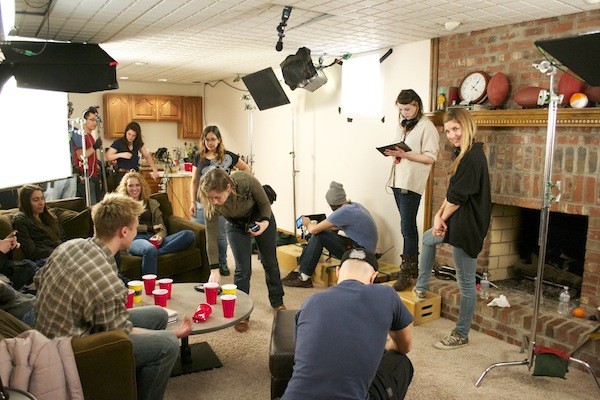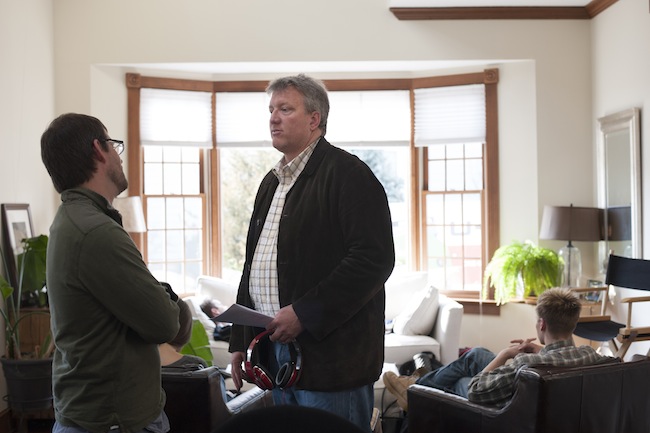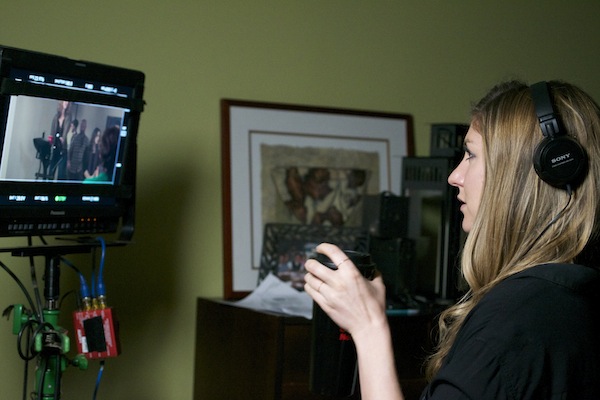It’s a sunny March day in the Pittsburgh suburb of Mount Lebanon, and a modest house has just become a movie set. Outside, crewmembers load equipment onto trucks parked on the narrow, car-lined street. Inside the residence, it’s a much more crowded and — thanks to blackout sheets on the windows — dim scene as people go about their work. In one corner, a producer hunches over a laptop, watching footage shot earlier at the Carrie Furnace, while in the dining room, lead actor Tobin Mitnick grabs a bite to eat, a wad of tissue doused in fake blood protruding from his nose.
On this, the second-to-last day of production, director Anna Martemucci appears calm, even breezy as she oversees the latest shot, a humorous moment involving Mitnick and his co-star, Carnegie Mellon senior Rachel Keller, who plays his love interest. In a packed bedroom, she watches Keller on a monitor — the young actress opens a door, finds two people having an intimate moment, and then turns to look past the camera, her expression a comical mug of disbelief. After a few brief takes, Martemucci hurries on to the next shot. They still have eight pages to shoot (feature films usually shoot two pages a day) and there’s no time to waste. Based on her confidence, one would never guess that she has never directed before.
“It felt a bit like some sort of personal growth boot camp, which was at times painful but really mostly awesome,” says Martemucci. “Making a film is difficult and taxing but also exhilarating and transformative.”
Martemucci has previously acted in films such as the indie comedy Breakup at a Wedding, which she co-wrote with her husband and partner Victor Quinaz and her brother-in-law Philip Quinaz. She also co-founded the comedy and production collective PERIODS.Films.
But this is no ordinary directorial debut. Martemucci is one of the competitors on The Chair, a 10-part documentary series that follows two up-and-coming filmmakers as they compete to make the best feature film from the same script, each with a budget of around $840,000. She and Shane Dawson, a Los Angeles-based YouTube phenom with over 5.7 million subscribers, were chosen for the series by Hollywood producer Chris Moore and Pittsburgh-born actor and producer Zachary Quinto. Moore, who also created the HBO filmmaking reality show Project Greenlight, worked with Point Park University and the non-profit organization Steeltown Entertainment to bring the project to the city. He serves as executive producer along with Quinto, Carnegie Mellon alums Corey Moosa and Neal Dodson, and Sean Ackers, all members of the media company Before The Door Pictures.
The Hollywood of the East
Martemucci and Dawson began shooting in January, working off a screenplay by Dan Schoffer entitled How Soon Is Now? Though they started with the same source, the filmmakers spun the material into two distinct films. Both concern freshman college students returning home for Thanksgiving but differ in tone and genre. Supervising Producer Josh Shader pitches Dawson's yet untitled project as “raunchy with a heart,” while Martemucci’s film Hollidaysburg (named after the borough near her hometown of State College, PA) invokes Perks of Being a Wallflower — meaning it’s funny, but more nuanced and “grounded in reality.” Shader also credits the city for playing a role in helping to distinguish the films.
“From a locale standpoint, you can shoot so many different things,” he says, rattling off the films' various shooting locations, among them the Duquesne Incline, Upper St. Clair and Braddock. “Both films have very different looks, and the fact that you can come into Pittsburgh and achieve two very different looks makes the city unique.”
His observation speaks directly to one of the major goals of The Chair, which is to showcase Pittsburgh’s reinvention as a regional film hub for the increasing number of productions lured here by the PA film tax credit. Since its creation in 2004, the program — which offers a 25 percent tax credit to productions that spend at least 60 percent of their total budget in the state — has attracted hundreds of film and television projects to Pennsylvania. Over the past five years, the Pittsburgh Film Office estimates that the incentive brought 50 film and television projects to the Pittsburgh region alone, including The Dark Knight Rises and Moore’s own film, Promised Land, resulting in hundreds of jobs and an economic boost of nearly $500 million. The recent surge in production has caught the attention of national publications such as Entertainment Weekly and CNN, who dubbed Pittsburgh the “Hollywood of the East.”
Setting a good example
The national entertainment media weren't the only ones who noticed Pittsburgh's success. Over the past decade, other state governments have started offering tax credits to filmmakers foregoing New York and California in search of less expensive and more diverse shooting locations. Massachusetts, Connecticut, North Carolina, Georgia, Louisiana and Illinois are among those giving the Keystone State a run for its money with uncapped film tax credits. (The PA film tax credit remains capped at $60 million a year.)
Steeltown Entertainment CEO Carl Kurlander, one of the Pittsburgh film community's most outspoken advocates, believes that limited funding could chase away future projects and affect the sustainability of the city’s emerging film and television industry.
“We were one of the first ten states to have tax credits that were competitive,” says Kurlander. “Now there are dozens. So we need to think of an innovative model and not assume that what worked yesterday is going to continue to work.”
In order to keep production business alive, Pittsburgh must be promoted as a financially and artistically viable option to producers and filmmakers. The projects must also provide economic benefits and jobs to the region in order to secure funding on a local level. The latter came into question when the Allegheny County Redevelopment Authority awarded a $225,000 grant to The Chair, prompting then City Councilman Matt Drozd to state that he didn't want public money supporting a project that provided what he saw as temporary jobs.
Pittsburgh's gain
As a film educator who's worked in Pittsburgh for seven years, Nelson Chipman understands Drozd's concern. But the Point Park Cinema Arts department professor, who stepped in as university liaison to The Chair, believes that, in this case, the benefits outweigh the risk.
“The county money was invaluable in getting the train out of the station,” says Chipman, referring to the role the grant played in The Chair's $3.25 million budget. “I can see both sides, but I think that with this project in particular, because of the multiple-season potential, it feels like it’s money well spent. For the short term, as well as for the potential long term.”
The Chair has already made an impact on the community. The films gave on- and off-set positions and internships to around 100 Point Park students and alumni, and provided work to other professionals throughout the city. One such individual, Rob Long, a member of the creative services firm Clear Story, did production design on Hollidaysburg. In addition, Shane Dawson stayed in the area to do post-production with Animal, the company behind the widely acclaimed, award-winning documentary Blood Brother.
The long-term benefits will become clear once the show airs this fall on an undisclosed premium cable channel. Kurlander and others believe that The Chair will highlight the kind of advantages only Pittsburgh can provide, including access to well-trained crews and dream shooting locations like Heinz Field, which was featured in Dawson's film.
“Go ahead and try to rent Yankee Stadium! See how that works out for ya,” Kurlander says with a laugh.
Shader, however, believes the show will fulfill multiple roles.
“I hope the documentary becomes a resource and a tool for aspiring filmmakers, in terms of getting to see the trials and tribulations of making a movie,” he says. “I think it'll also just be entertaining as hell to watch.”



